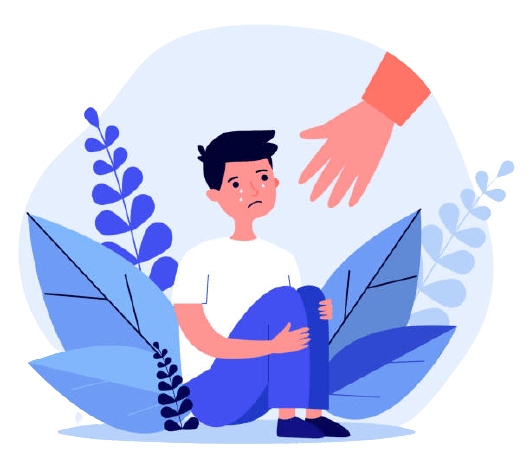Online Grief Therapy | Best Therapist For Grief Help
- Setup a free & confidential chat on your grief issues
- Unlimited help through grief self-care app
- Live Video or Chat sessions with top grief therapists
Begin Therapy
Consult online with best Therapist
Get the best help for Grief
TherapyMantra is here to help you on your path to recovery from grief. We match you with the best grief therapists available 24/7 via video call or messaging.
Match with Grief Therapists
We assign the best counsellors experienced in grief issues based on your needs.
Affordable and Effective
Our online sessions are 90% less expensive than in-person therapy, available 24/7.
Self-Care for Grief
We offer ongoing grief support through self-care tools, grief help videos, chat groups, meditations, breathing exercises, and other resources.

Wondering if it’s just a phase or something more? Take our Free online grief test to find out?
How it works?
You are matched with a grief counsellor based on your needs and preferences. You get a secure “therapy room” where you can communicate with your counsellor via chat or phone. You can write or talk about grief & ask questions to deal with grief.

Register for Grief Counseling
Simply complete a 5-minute online form to tell us about your Grief issues

Consult with your Grief Therapist
We connect you with Grief counsellors who are available 24/7 based on your preferences and needs.

Connect to Our App
Apart from Video / chat sessions, our app offers self-care tools, videos and meditations to help you deal with your grief.
Best Grief Therapists
Positive conversations, exercises, and meditations are used by TherapyMantra psychologists to help you deal with grief. Our Grief therapists outperform traditional counselling as you get matched from a pool of 500+ grief counsellors, who offer 24/7 unrestricted private chat.








What is Grief?
Grief is often described as a five-stage process, but in reality, it’s different for everyone. The five stages of grief are denial, anger, bargaining, depression, and acceptance. But not everyone goes through all five stages, and some people cycle through them multiple times. Grief can be triggered by any number of events, and it can take a long time. Grief is a unique process for each person who goes through it.
Not everyone goes through all five stages. People often cycle through the different stages multiple times or get stuck on one stage.
Grief can be triggered by any number of events, such as the death of a loved one, the end of a relationship, or a major life change. It can take a long time for someone to process their grief.
Types of Grief
There are three types of grief:
- Normal or healthy grief: This type of grief is usually triggered by a significant event, such as the death of a loved one. It’s normal to feel a range of emotions, such as sadness, anger, and guilt. People often need time to process their grief. It’s also normal to think about your loved one, feel their presence, and even talk to them. Most people recover from this type of grief within six months or less.
- Chronic grief: This type of grief can last longer than six months and severely interfere with everyday life. It may be related to unresolved feelings toward the person who died.
- Pathological grief: This type of grief can be all-consuming and life-threatening. It may involve intrusive thoughts about the person who died, intense sadness, panic attacks, social isolation, or other symptoms that get in the way of everyday life. People with pathological grief may need help from mental health professionals to cope with their extreme grief.
Treatment Options For Grief
There is no one-size-fits-all answer for how to deal with grief. Some people may need counseling or therapy, while others may simply need time and space to process their emotions. Here are some possible treatment options:
- Counseling or therapy: This can be helpful for people who are struggling to cope with their grief. Counseling can provide a safe place for people to talk about their feelings and emotions.
- Support groups: Support groups can be a great way to connect with other people who are going through a similar experience. It can be helpful to share your experiences and listen to the experiences of others.
- Time and space: Some people may just need time to process their grief on their own.
- Prayer or meditation: These can be a way for people to connect with loved ones who have passed away. They can provide comfort, support, and encouragement during difficult times.
- Writing or physical activity: Journaling or keeping a gratitude journal can be helpful for people to express their thoughts and feelings. Physical activity, such as running or hiking, can also help people to release emotions and process grief.
- Medication: In some cases, medication may be needed to help people cope with their grief. If you are struggling to cope with your grief, please consult a mental health professional.
How can therapy help with Grief?
Grief is often a very difficult emotion to cope with, and it can be hard to know how to get help. Fortunately, therapy can be a great way to address grief and work through the associated emotions. Here are some of the ways that therapy can help with grief:
- Therapy can provide a safe space for you to talk openly about death.
- Therapy can help you to understand your grief.
- Therapy can help you to develop tools to cope with grief.
- Therapy can help you better understand yourself.
If you are struggling with grief, it is important to seek help. Talk to your doctor or contact a therapist to see if therapy is right for you. Remember, you are not alone in this. There is help available, and you can get through this.
Therapy options for Grief
There are many different types of therapy available for treating grief. Some common therapies include:
- Psychotherapy: Also known as talk therapy, psychotherapy involves meeting with a therapist to discuss your thoughts and feelings. This can help you understand why you feel depressed and learn how to deal with your symptoms.
- Cognitive Behavioral Therapy (CBT): This is a type of psychotherapy that can help you identify unhealthy patterns of thinking or behavior. Then you can learn healthier ways to cope with difficult situations or feelings.
- Interpersonal Therapy: This focuses on the different relationships in your life. It helps improve communication skills and relate to others better, which can relieve some of your grief symptoms.
- Behavioral Therapy: This type of therapy focuses on changing your actions and behaviors rather than discussing your thoughts and feelings. It can teach you healthier ways to cope with problems instead of turning to drugs or alcohol, for example.
- Other therapies: You may also want to ask your therapist about alternative forms of therapy like yoga, meditation, art or music therapy, dance therapy, biofeedback and neurofeedback.
How to find a grief therapist?
TherapyMantra can help you find a grief therapist near you. We have over 500+ therapists listed on our therapist directory. You can follow the following steps to find a good grief therapist:
- First, ask your family doctor or anyone else you are seeing for a referral for a therapist.
- The next thing you’ll want to do is ask your friends and loved ones for referrals.
- The next thing you’ll want to do is look online. There are many websites that help people find therapists in their area who can treat things like grief.
10,000+ Happy & Healed Grief patients

“One of the things I enjoy about this forum and all of the different people who make it up, despite our differences, is that I get to learn something new from each of you. Every new person I meet broadens my horizons. I consider myself fortunate to have each of you present.”
Kevin,
1 year on TherapyMantra
FAQs
When you grieve, you often experience intense and enduring feelings of disbelief, shock, despair, sadness, and guilt, which can be difficult to deal with. Nonetheless, these feelings are a normal part of the healing process. Experiencing them will allow you to move on with your life.
- Recognize your suffering.
- Recognize that grief can elicit a wide range of unexpected emotions.
- Recognize that your grieving process will be unique to you.
- Seek out face-to-face support from people who care about you.
Back pain, joint pain, headaches, and stiffness can all be caused by grief. The pain is caused by an excess of stress hormones released during the grieving process. These effectively stun the muscles they contact. Stress hormones have the same effect on the body as broken heart syndrome.
There is no set timetable for dealing with grief. Although you may begin to feel better in 6 to 8 weeks, the entire process can take anywhere from 6 months to 4 years. In small ways, you may begin to feel better. It will become easier to get out of bed in the mornings, or you may have more energy.
Depression is typically the most difficult and prolonged stage of grief. Ironically, it is finally allowing ourselves to feel our deepest sadness that brings us out of our depression. We arrive at a point where we accept the loss, make some sense of it in our lives, and are able to move on.
Sadness is often the most difficult stage of the grieving process, as it is the stage in which we feel emptiness in the face of life without our friend. For some, the mourning that comes with this stage can turn into depression that affects every aspect of life.


